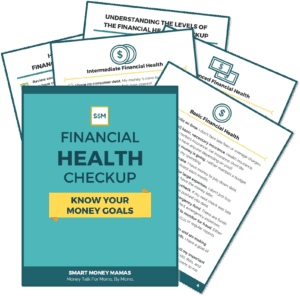When it comes to money, we all have questions. Unfortunately, not everyone has good answers. And if you don’t have a solid foundation of financial knowledge, it can be hard to tell the worst financial advice from the best. And when we can’t trust our financial advisors, the water gets even muddier. Some financial advice sounds reasonably logical while actually being downright damaging. Like that old trick of carrying credit card debt to improve your credit score. Really? Who starts these rumors? Credit card companies?
So for today’s post, I reached out to personal finance bloggers and money smart friends to round up the worst financial advice we’ve ever heard. The stuff that turns us into the nosy people in coffee shops who just have to turn around and put in our two cents. The stuff we listened to until it turned up on our personal “biggest financial mistakes” list. Some of it turned out to be pretty cringe-worthy!
Table of Contents
Worst Financial Advice We’ve Ever Heard
Bad Advice About Saving for Retirement
With life expectancies continuing to increase, many of us are saving for 15-30+ years of retirement. Preparing for that period of time without a 9-5 income is a huge feat, so don’t let bad advice trip you up!
Saving for retirement when you’re young…
With college and high school graduations coming up, saving for the future as a young person isn’t a bad place to start. Here’s a story that still makes my skin crawl!
A family friend had a son going off to NYC after college graduation with a good job. I heard his parents tell him not to worry about saving and investing for the future yet because he should just enjoy being young. He could “worry about that stuff when he got married.”
Apparently, this isn’t uncommon advice. Ben from Latter-day Finance told me:
When I did financial planning, I met a couple where the wife said her parents told her to enjoy her life, live in the moment, and not to worry about saving for retirement. I asked her how her parents are doing now in their 60s and she said they’re miserable because they’re still working.
Oof. High school and college grads have the greatest gift. Time. Saving while your young and your budget doesn’t have the heavy responsibilities of family means you get an extra 5-10 years of compound growth. Here’s to hoping these kids didn’t listen to their parents! Start early, make it a habit, and grow your wealth!
Investing over 401k match…
You are better off investing your money in the stock market yourself, instead of getting a match in your 401K.
This one comes from a good friend of mine and some coworkers at her old job. These people thought that by removing themselves from the investment restrictions in their 401Ks (certain funds, limits on day trading), they could beat the immediate, 100% return of an employer match! They were giving up free money! But don’t worry, with this kind of logic, I’m sure they were excellent investors.
Bad Advice About Investing
We’ve all heard about the stock that is a “sure thing” from our neighbor or crazy uncle. But what about advice that is worse than the perfect stock that will “send your kids to college”?
Turning over responsibility to a financial advisor…
Mrs. Groovy, from Freedom is Groovy, shared this piece of “advice” she’s heard.
It’s OK to give your financial advisor full power to buy and sell investments without your consent each time.
No, no, no. Your money should never be invested in things you aren’t aware of and haven’t had the chance to understand. As I’ve discussed on the blog before, not all financial advisors have a fiduciary duty that requires them to put your needs ahead of their own. Plus, odds are, they aren’t any better at beating the market than you are!
Big risks mean bigger returns…
Our Financial Path told me of some advice that could get you in major trouble!
You should buy blue chip stocks on margin! You can get 70% loan-to-value so you will make 3x the profits.
For those of you who don’t know, margin accounts are a way to invest with borrowed funds. This is similar to borrowing money from your favorite loan shark to place a bet with your local bookie. If you win, you pay back the loan shark and you’ve made money with someone else’s money. If you lose, you may be on crutches for a while.
You can never time the market, so investing with money you don’t have and banking that the market will go up is a losing game. Not to mention, fees on a margin account will bleed you dry!
Bad Advice About Real Estate
For most of us, the biggest check we will ever write will be for the downpayment on our homes. So it isn’t surprising that some bad advice comes into play with real estate. Here’s some particularly rough stuff!
On buying a house…
Buy as much house as you can afford. Real estate always goes up.
This gem was told to Physician on Fire. In 2007, he listened to the advice and built his dream home. Only to sell it for an over $200,000 loss in 2015.
When buying a house, the last thing you want to do is end up house poor. Ideally, you want to keep your housing costs under 30% of your monthly take-home pay and have a downpayment of at least 20% to ensure you don’t end up upside down on your mortgage if the cycle turns.
On “investing” in home improvements…
It is always worth it to spend money on home improvements. You’ll get it back when you sell.
This one comes from my real estate agent. She didn’t have a specific person she heard saying this but told me way too many of her clients seem to believe it. People spend $20K-$100K putting in an inground pool only to find out bank appraisals assign zero value to pools and that they potentially cut their buyer pool in half by having one.
Her advice is to consider these key things before making any home improvements and be alright with any improvements you make to your home being just for you. It will be for your taste and desires, and there is no promise a buyer will assign a value to it. Be prepared to write the check for your own improvement and only get back 50%, or less, of the cost when you sell.
Bad Advice About Debt
While the financial benefits of a debt-free lifestyle seem to be spreading, there is plenty of bad advice to go around when it comes to debt. And this isn’t really surprising. Debt is enormously profitable for credit card companies, banks, and student loan providers. So what’s the worst we’ve heard?
Debt improves your credit score…
Carry a balance on your credit card to improve your credit score.
Ok, I know I mentioned this one at the start of the post, but it is worth repeating. You do not need to pay a dime of credit card interest to have a good credit score! The balance that gets reported to the credit agencies is the statement balance, not what is left over after you pay your bill. Use your credit card responsibly, pay off the balance in full every month, and your credit score will be just fine!
Negative equity? No problem!…
Refinance the negative equity on your auto loan to buy a new car.
No revelation that Vicki from Make Smarter Decisions heard this one directly from car dealerships!
The idea of refinancing negative equity is that if you owe more than your car is worth, you can roll that extra money you owe into the loan for your new car. All this does is ensure you are starting in the hole with a new, rapidly depreciating asset. You’ll be stuck with negative equity the next time you need a car, and until you can buckle down and pay off your loans in full, you’ll be paying interest on the debt for a car you no longer own for years to come.
And that’s the end of today’s worst financial advice roundup! Unfortunately, there is a lot of bad advice out there. My recommendation is to always do your research and, as Kelly Clarkson says, “Never take advice from someone you wouldn’t want to trade places with!”
Do you have any bad investment advice stories? Any advice you listened to and wish you hadn’t? Drop it in the comments to start destroying bad advice!





It’s just so scary that these are common things that people hear! And they are the people NOT reading about financial independence too… ???? It’s hard to sort out good and bad advice when you are trying to make a decision. Thanks for sharing!
Thanks for including me. There’s so much great advice here, that is, if you use it like a Seinfeld episode, “The Opposite” where George does the exact opposite of what he’d normally do to get results!
The big one for me is buy penny stocks to get rich quick. I get bombarded by ads for this all the time in financial websites. I also had a friend who swore by being a day trader trading penny stocks back in 2006. That friend is no longer a day trader for obvious reasons. There is no quick buck in investing.
That one is super frustrating. There is definitely no quick buck! I never understood why anyone thinks penny stocks have more upside and less downside because they are cheap. Every stock has the same downside potential (100%!) and penny stocks are penny stocks for a reason!! Usually, because they are hovering around bankruptcy.
Thanks for sharing FTF!
Wow, the worst one is carrying a credit card balance… ugh.
Thanks for sharing Chelsea – I had a good laugh 🙂
I think they call them ‘speculative’ investments. ????
There’s a part of me — thank goodness it’s only ever been a minuscule part of me — that is intrigued by speculative investments. In my particular case that has been penny stocks, options trading, and yes, bitcoin. I think the attraction originates from my meager upbringing. Get rich quick! It’s gonna be huge!
Now thankfully, information and reason (much attributed to PF readings and communities like this) guided me to only ever risk 1% (or even less) of my portfolio in such areas. Now years later . . . not a single one ever worked out for the good. The only good they ever provided was humorous stories about scams and hacks from all parts of the globe. Ugh, the stories I could tell . . .
I think shows like Flip or Flop make people think that home improvements always pay off big, when that is rarely the case.
“Well if I remodel my bathroom for $15,000, my home’s value increase $50,000!” Uhhhh….no.
Pingback: The Sunday Best (5/7/2017) - Physician on FIRE
I work in mortgages I can assure the credit card equals good credit score is complete crap and they reduce your borrowing capacity by using the limit not the amount owed. Good savings and paying your bills on time are the only things required to Keep you in good stead if you need to borrow for a house. Also always factor in repayments if interest doubles, banks use 2 percent but in down times that is not enough.